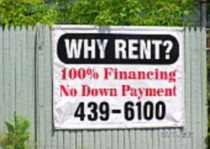Coach Mitch’s REFLECTIONS™
Landlording
If you are going to be part of the real estate investing business, understand that you will be a landlord at some point.
Get over it
I know, I know. No one wants to be a landlord. Well, I’m sorry, but it comes with the real estate investing territory.
It might not hurt much
Imagine if you are looking at a house that you believe is a good deal and the property has a tenant with a lease. Do you turn that deal down and walk away just because there is a tenant to deal with? Maybe you do. But then again, maybe you think it through a bit more thoroughly.
Why should you be a landlord?
For the money, honey!
There are times when the money from a rental is just too good to pass up. I don’t even consider a property with less than $200 per month clean profit, that is, after ALL expenses are paid. I don’t puff up the return by counting in depreciation. I currently don’t have a unit with less than $350 per month net profit. That’s not bad. You don’t need too many rentals to have a comfortable cushion with that level of margin.
What about the horror stories!
I have had my share of bad tenants. However, there are ways to mitigate your negative potential.
Rules to follow:
1 Always get a complete tenant record.
This will include all of a tenant’s information, including how to contact relatives or friends, license plate numbers, driver’s license, several credit cards, etc. When a tenant skips, you want to be able to trace them.
I learned this from the owner of a Buy Here, Pay Here auto dealership. She would know where the car owner went to drink, who the friends were and who all the family members were and all their contact information, etc.
When the car owner missed a weekly payment, this dealer would be on the phone, tracking down the car so that she could send the tow truck and pick it up. She knew where the car was because she had asked where the owner was drinking. Then she could probably get her payment, because the owner needed the car, but she was in possession of the car, which she could legally take, then resell, and recoup any loss via judgment. Her record: taking and reselling the same car nine times.
2 Always call the previous landlord, not only the current landlord.
The previous landlord will tell you the truth about this prospective tenant.
Be sure that you are speaking with the previous landlord and not just a friend of the prospective tenant who is playing that role. Prior to calling the previous landlord, check the deed records to find the owner’s name at the property address. More and more, you can do this online or you can call your county recorder and ask that they look up who owns the property at 123 Broadway. Then, ask the previous landlord to verify something, like the date they got the property or the seller, etc.
3 Get a hefty security deposit.
I now get three months. I get the first month’s rent, plus two months security. Costs to repair are very high these days. By asking for higher security, you ferret out those who do not save.
4 Document the property as a tenant moves in and out.
You should be taking pictures and/or movies, with dates to show the condition of the property upon move in. Record the make, model number, and serial numbers of all appliances. Record all fixes and all communications with tenants. Record all damage with a picture and a follow up letter. Always communicate in writing. Your lawyer will love you and the judge will believe you.
5 Be a good landlord.
I was involved in my REIA, Real Estate Investors Association, for over ten years, mostly on the Board of Directors or as President. I heard lots of stories, about bad tenants, and about bad landlords. Guess what, sometimes I had to side with the tenant. Often landlords are so cheap that they hurt themselves.
I always put this into my ads: “Good landlord seeks responsible tenant.” You will get about 50% – 66% fewer calls because the bad tenants will screen themselves out.
I am very careful about charging fees. Though allowed, I will often not charge a fee, however, I will charge if I feel that I am being taken advantage of. I will let the tenant know my reasoning for not charging the fee. They are always grateful for not being hit with another $50 fee. You build up some good will by being generous. Document that you let the fee pass because a judge could rule that, once not charged, you have given up the ability to charge.
6 Only rent to those who will not leave their job.
This is an interesting thought and is important, especially if the tenants owe you money? By only renting to persons who work for government or to those who are in a serious career, you greatly raise your potential of getting your rent paid or getting paid on a judgment.
7 Become comfortable with confrontation.
If a tenant is not performing well, then write a letter and inform them of your thoughts. Threaten to evict but first put the tenant on probation. Know the procedures for eviction and for going to small claims court and to superior court in each area that you own property. Know the procedures for collecting on a judgment.
8 Do a thorough Exit walk through
As soon as you know that a tenant is leaving, schedule a walk through and document what needs to be done to bring the property up to a good condition. Document everything. Don’t be shy about this. With the high cost of everything these days, you need to mitigate any losses. You can easily lose any profit you made or will make if the rehab is costly and you can not recoup the fix-up monies.
9 Pursue judgments.
You will be surprised that the process is manageable, though a bit cumbersome. It is great to get a series of checks each month, that pays off a wage garnishment.
The military will help you track down any soldier, anywhere in the world, and they will help you with your garnishment. Especially today, those in government and in education are thankful for job security. Most professionals do not want their reputations tarnished by judgments so they are less likely to skip.
If you have been a good landlord, if you have documented the situations, if you are respectful to the tenant and to the judge when in court, then you have a decent chance of winning.
10 Don’t be in a hurry to get a tenant.
Be choosey! The higher the quality of the tenant, the less likely you are to have negative issues and if you do, the more likely it will be that you can collect on a judgment. Getting your money is the prime concern.
11 Include lease clauses that protect your interests.
I have tenants pay for the first $500 of all repairs, excepting major systems. I have the ability to break the lease and sell the property without any penalty. I don’t include appliances with the rental. Rather, I rent the appliances to the tenant, so that if they break, I might force the tenant to buy their own appliances. I require a two year tenancy, with built in rental increases. For an extra fee, I include a “Non-option option.” This is a right of first refusal to purchase, should I desire to sell. I seek being paid via automatic electronic bank transfer. If a tenant falls behind, I have them pay weekly. Allow for your ability to allow an exception in a stated policy without you losing the ability to implement that policy in the future.
See Coach Mitch’s “Ridiculously Simple System…”™ for details.
Landlording can be manageable and profitable.








Leave a Reply